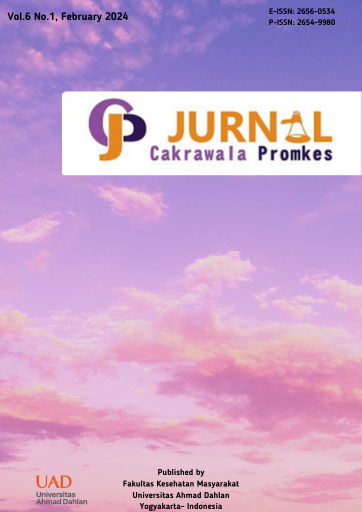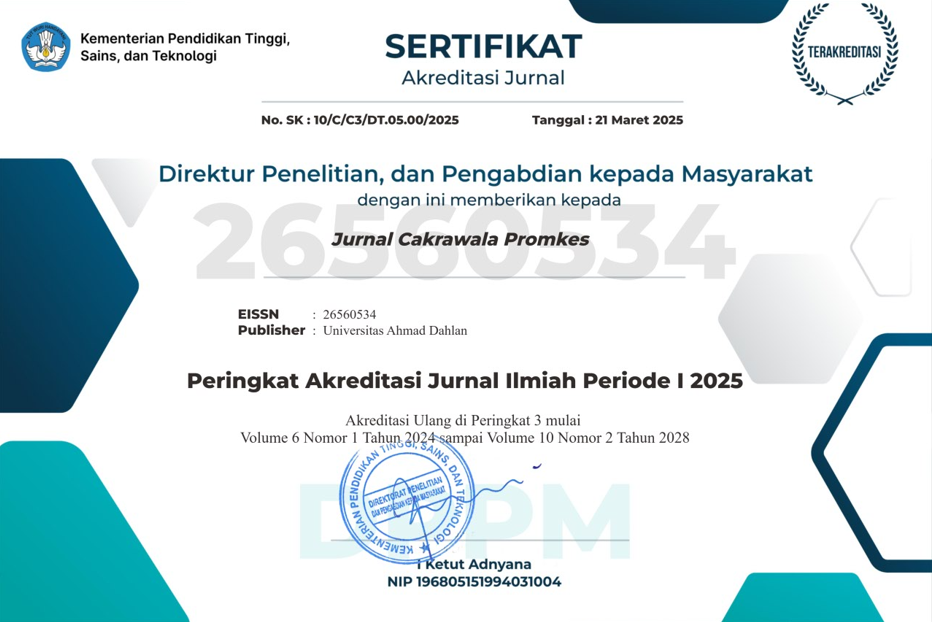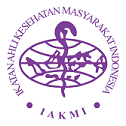Factors associated to mothers’ behaviors in dealing with diarrhea among toddlers in South Atambua
DOI:
https://doi.org/10.12928/jcp.v6i1.8576Keywords:
Diarrhae, Mother's behavior, Handling diarrhae in toddlersAbstract
Diarrhea can be treated properly to reduce its severity. Behavioral elements within society are risk factors that can lead to diarrheal disease. Poor sanitation practices, inadequate access to clean water, improper food handling, and insufficient hygiene habits can increase the risk of transmission of diarrheal illness. Additionally, socio-economic disparities, cultural beliefs, and educational levels can influence individuals' behaviors related to hygiene and sanitation, further exacerbating the risk of diarrheal diseases. Compared to other Puskesmas, the one in South Atambua had a very high number of diarrhea cases in 2021—up to 88 incidents among toddlers, according to Belu District Health Office statistics. This study aimed to identify variables associated with mothers' conduct when treating their toddler's diarrhea. This kind of cross-sectional, quantitative study was carried out in Atambua Selatan, employing a sample size of 72 participants and a simple random sampling technique. The Chi-Square statistical test was utilized in both univariate and bivariate data analysis. The findings indicated that while education level had no association with mothers' behavior in managing the incidence of diarrhea among newborns, knowledge and family support did (p-value = 0.000) have a relationship with maternal behavior in handling diarrhea in toddlers. Otherwise, mothers' behaviors regarding diarrhea among toddlers were not correlated with their level of education. In the future, health officers are expected to provide information on how to deal with diarrhea among toddlers regularly and involve other family members to support mothers. The collaborative efforts of health officers and family members are essential in safeguarding toddlers' health and well-being during diarrhea episodes.
References
Derseh BT, Tafese NM, Panari H, Bilchut AH, Dadi AF. Behavioral and environmental determinants of acute diarrhea among under-five children from public health facilities of Siyadebirena Wayu district, north Shoa zone, Amhara regional state, Ethiopia: Unmatched case-control study. PLoS One [Internet]. 2021;16:1–14. Available from: https://doi.org/10.1371/journal.pone.0259828
Teshale AB, Tesema GA, Tessema ZT. Spatial variations and associated factors of knowledge of ORS packet or pre-packaged liquids for the management of diarrhea among women of reproductive age in Ethiopia: A spatial and multilevel analysis. PLoS One [Internet]. 2021;16:1–15. Available from: https://doi.org/10.1371/journal.pone.0247772
Leung AKC, Leung AAM, Wong AHC, Hon KL. Travelers’ diarrhea: A clinical review. Recent Pat Inflamm Allergy Drug Discov [Internet]. 2019;13:38–48. Available from: https://doi.org/10.2174/1872213X13666190514105054
Humrah Humrah, Safiyanthy I, Wong A, Mukarramah S. Description of knowledge of mothers of toddlers in initial treatment of toddler diarrhea in Bone Village. Bajeng District. Gowa at 2017 years. J Bidan “Midwife Journal.” 2018;5:1–7.
Ministry of Health of the Republic of Indonesia. Reducing the prevalence of stunting in 2021 as capital towards Indonesia’s golden generation 2045 [Internet]. https://sehatnegeriku.kemkes.go.id/baca/umum/20211227/4339063/penurunan-prevalensi-stunting-tahun-2021-sebagai-modal-menuju-generasi-emas-indonesia-2045/. 2021. Available from: https://sehatnegeriku.kemkes.go.id
Belu District Health Service. Chapter V public health annual report in 2020. East Nusa Tenggara; 2020.
Setijaningsih T. Description of first aid in the family in handling diarrhea in toddlers at the mtbs polytechnic uptd community health centers in Blitar City. J Borneo Holist Heal. 2020;3:129–39. https://doi.org/10.35334/borticalth.v3i2.1685
Irin I, Kurniadi A. The relationship of mother’s knowledge, attitude, and behavior regarding diarrhea with the number of diarrhea toddlers taken to the health facility. J Urban Heal Res [Internet]. 2022;1:38–46. Available from: https://doi.org/10.25170/juhr.v1i1.3850
Syan SAE, Zaghamir DEF, Sayed MA, Ahmed SSG. Effect of video-assisted structured teaching program on mothers’ knowledge and practices regarding diarrhea prevention among children less than five years. Egypt J Heal Care [Internet]. 2020;11:832–42. Available from: https://doi.org/10.21608/ejhc.2020.181252
Widyastuti W, Pratiwi YS, Aktifah N, Isyti’aroh I. Breastfeeding and the occurrence of diarrheal dehydration in toddler. Proc Ser Heal Med Sci. Purwokerto: Universitas Muhammadiyah Purwokerto; 2022. p. 119–26. https://doi.org/10.30595/pshms.v2i.233
Mareny R, Sihombing E, Barimbingan DL, Valensi R. Factors related to the incidence of diarrhea in children 1-5 years in the work area of Ujung Padang Health center, Simalungun district. Sci Midwifery J [Internet]. 2022;10:3968–72. Available from: https://doi.org/10.35335/midwifery.v10i4.1029
Ridawati ID, Nugroho B. Relationship between mothers’ attitudes with diarrhea prevention in toddlers. Str J Ilm Kesehat [Internet]. 2020;9:998–1005. Available from: https://doi.org/10.30994/sjik.v9i2.392
Anggraeni R, Aljaberi MAA, Nisha Nambiar N, Sansuwito T Bin, Wati NL. The relationship of supplementary feeding, breast milk (mp-asi) to infants with the event of diarrhea. Int J Nurs Inf [Internet]. 2022;1:1–9. Available from: http://dx.doi.org/10.58418/ijni.v1i1.9
Tri Haswari G, Wijayanti Y, Laksono B. Analysis factors of diarrhea incidentin toddlers at Purwodadi District Health Centre, Grobogan. Public Heal Perspect J [Internet]. 2019;4:232–9. Available from: http://journal.unnes.ac.id/sju/index.php/phpj
Nida AK, Qomaruddin MB. The relationship of intentions and social support with mother’s behavior for preventing the event of diarrhea in toddlers in the Kalitidu Community Health Center Work Area. Kesehat Masy. 2021;11:95–9. https://doi.org/10.56338/pjkm.v11i2.1824
Murti B. Principles and Methods of Epidemiological Research. Surakarta: Pasca sarjana IKM UNS; 2016.
Sianipar CM. Mother ’ s knowledge on diarrhea in toddlers at Sangkunur Community Health Center. CARING Indones J Nurs Sci [Internet]. 2021;3:47–56. Available from: https://doi.org/10.32734/ijns.v3i1.6112
Misriyanto E, Sitorus RJ, Misnaniarti. Analysis of environmental factors with chronic diarrhea in toddlers in Jambi City in 2019. Int J Sci Soc. 2020;2:300–10. https://doi.org/10.54783/ijsoc.v2i4.216
Wahab MJ, Faris SH. Mothers’ knowledge about prevention of diarrhea in children under five years at the Eastern AL Hamza City. Int J Health Sci (Qassim) [Internet]. 2022;6:10408–16. Available from: https://doi.org/10.53730/ijhs.v6nS1.7260
Elhusein AM, Fadlalmola HA. Mothers’ knowledge and practices regarding prevention of dehydration in children under five years of age: a study in the context of Sudan. Healthc Rev [Internet]. 2020;1:19–23. Available from: https://sriopenjournals.com/index.php/healthcare_review/index
Susanty D, Mitra M, Kamal Y, Nurlisis N, Harahap H. Factors influencing the use of posyandu for the elderly in Sungai Piring Village, Riau. J Cakrawala Promkes. 2023;5:58–66. https://doi.org/10.12928/promkes.v5i1.6617
Pastorino R, Loreti C, Giovannini S, Ricciardi W, Padua L, Boccia S. Challenges of prevention for a sustainable personalized medicine. J Pers Med. 2021;11:311–9. https://doi.org/10.3390/jpm11040311
Badi’ah A, Mendri NK, Palestin B, Subargus A, Huriah T, Khasanah F, et al. Family empowerment psychoeducation on family support caring of children diarrhea. Open Access Maced J Med Sci [Internet]. 2022;9:137–41. Available from: https://doi.org/10.3889/oamjms.2022.7834
Feleke Y, Legesse A, Abebe M. Prevalence of diarrhea, feeding practice, and associated factors among children under five years in Bereh District, Oromia, Ethiopia. Infect Dis Obstet Gynecol. 2022;2022. https://doi.org/10.1155/2022/4139648
Tesfaye TS, Magarsa AU, Zeleke TM. Moderate to severe diarrhea and associated factors among under-five children in Wonago District, South Ethiopia: a cross-sectional study. Pediatr Heal Med Ther. 2020;Volume 11:437–43. https://doi.org/10.2147/PHMT.S266828
Agegnehu MD, Zeleke LB, Goshu YA, Ortibo YL, Mehretie Adinew Y. Diarrhea prevention practice and associated factors among caregivers of under-five children in Enemay District, Northwest Ethiopia. J Environ Public Health. 2019;2019. https://doi.org/10.1155/2019/5490716
Mogharab V, Rajput S. Factors associated with diarrhea in children under 12 years of age referred to Ostad Motahari hospital of Jahrom in 2020. J Fam Med Prim Care [Internet]. 2022;11:169–70. Available from: https://doi.org/10.4103/jfmpc.jfmpc_342_22
Astutik E, Efendi F, Sebayang SK, Hadisuyatmana S, Has EMM, Kuswanto H. Association between women’s empowerment and diarrhea in children under two years in Indonesia. Child Youth Serv Rev [Internet]. 2020;113:105004. Available from: https://doi.org/10.1016/j.childyouth.2020.105004
Pahmi L, Endah WC. Household risk factors for diarrhoea disease in children under five years old in Indonesia. J Ilmu Kesehat Masy [Internet]. 2019;10:50–8. Available from: https://doi.org/10.26553/jikm.2019.10.1.50-58
Magdalena I, Rantetampang AL, Pongtiku A, Mallongi A. The risk factors environment and behavior influence diarrhea incidence to child in Abepura Hospital Jayapura City. Int J Sci Healthc Res [Internet]. 2019;4:171–80. Available from: https://ijshr.com/IJSHR_Vol.4_Issue.1_Jan2019/IJSHR0024.pdf
Notoatmodjo S. Health promotion & health behavior. Jakarta, Indonesia: EGC; 2012.
Downloads
Published
Issue
Section
License
Copyright (c) 2024 Putri Intan Permata Nusantara, Rina Wati Sirait, Amelya B Sir

This work is licensed under a Creative Commons Attribution-ShareAlike 4.0 International License.
Authors who publish with JCP: Jurnal Cakrawala Promkes agree to the following terms:
- Authors retain copyright and grant the journal the right of first publication with the work simultaneously licensed under a Creative Commons Attribution License (CC BY-SA 4.0) that allows others to share the work with an acknowledgement of the work's authorship and initial publication in this journal.
- Authors are able to enter into separate, additional contractual arrangements for the non-exclusive distribution of the journal's published version of the work (e.g., post it to an institutional repository or publish it in a book), with an acknowledgement of its initial publication in this journal.
- Authors are permitted and encouraged to post their work online (e.g., in institutional repositories or on their website) prior to and during the submission process, as it can lead to productive exchanges, as well as earlier and greater citation of published work.

This work is licensed under a Creative Commons Attribution-ShareAlike 4.0 International License












